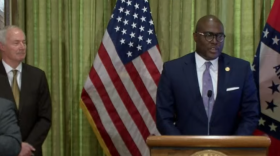Four weeks after the first confirmed case of the coronavirus was identified in Arkansas, 1,023 people in the state have tested positive for the virus. Gov. Asa Hutchinson made the announcement Wednesday, noting there were 77 additional cases over the previous 24 hours.
While the state remains without any formal orders for people to stay at home, Hutchinson said he would not consider allowing communities to lift restrictions on businesses already in place.
“We’re not there yet, and I would expect that when we get there, that will be addressed at a statewide level,” Hutchinson said. The governor's comments came shortly after delivering his annual State of the State Address to formally open a fiscal session of the Arkansas General Assembly.
The state’s death toll from COVID-19 remained unchanged Wednesday at 18. Of the 1,023 people who have tested positive, 76 are hospitalized with 30 people receiving mechanical ventilation.
As the impact of the outbreak continues to negatively affect the state’s economy, Hutchinson announced he would allocate an additional $1 million from his quick action closing fund to go toward providing short-term bridge loans of up to $25,000 to small businesses through the Arkansas Economic Development Commission.
Hutchinson said the state has received over 800 applications for bridge loans, and that $3 million of those loans has already gone out to small businesses.
Secretary of Commerce Mike Preston said federal money will be available for freelancers, independent contractors and other self-employed Arkansans, though it could be as long as three weeks before payments are sent out.
“We just received our guidance from the federal Department of Labor on this on Sunday night, and what it’s going to require us to do is to build an entire new system to be able to process and handle these types of claims,” Preston said. “Arkansas is not unique in this; every state is going through the same process.”
That funding will come from the Pandemic Unemployment Assistance program, which is part of the $2 trillion federal CARES Act, Preston said. Though those funds will be delayed, Arkansans will be able to receive payments back-dated to when anyone's loss of employment began.
Preston said other people receiving unemployment insurance will soon see an additional $600 in payments in the form of Pandemic Unemployment Compensation checks from the CARES Act. According to Preston, 110,000 Arkansans have applied for unemployment insurance, with as many as 150,000 expected to apply by the end of the week.
Aside from federal funding, direct payments to workers from state funds are also delayed. Hutchinson announced in late March that the state would provide $55 million in direct payments to non-physician direct care workers in the state, primarily nurses.
Hutchinson said Wednesday those payments, which would provide $250 per week to all healthcare workers and $500 per week to workers at facilities treating COVID-19 patients, are delayed until the state is granted a waiver by the federal Centers for Medicare & Medicaid Services.
“They have not granted that waiver, which is disappointing to me. I’ve talked to the officials there, they’re still reviewing it, so we’ll wait and see where that goes,” Hutchinson said. “If that waiver is not granted, we’re going to look for other ways to see if we can… meet those needs.” The delay comes as the number of Arkansas healthcare workers testing positive for the coronavirus rose to 147.
Earlier Wednesday, Arkansas Lt. Gov. Tim Griffin announced the state would receive 100,000 doses of Hydroxychloroquine, a drug being tested to treat COVID-19, from drug maker Amneal Pharmaceuticals. Dr. Cam Patterson, chancellor of the University of Arkansas for Medical Sciences, said it’s “too soon to tell” whether the drug is effective in treating the disease caused by the coronavirus.
Patterson said one of the drug's possible side effects “causes a change in the conduction system, the electrical system of the heart, and can lead to fatal arrhythmia. So it’s not a drug without side effects. It’s not a drug to be taken without reason.”
In late March, the U.S. Food Drug and Administration authorized emergency use of the drug for treatment of COVID-19 even though it has not gone through clinical trials for that purpose. Despite the lack of testing, demand for Hydroxychloroquine spiked after announcements that it might be a treatment for COVID-19.
Patterson said the donation will help meet the needs of patients who have been using the drug for years, like those with lupus and rheumatoid arthritis, for whom the drug has been tested and approved.
As lawmakers begin to draft a state budget that factors in a $353 million loss in state revenue, Hutchinson said the average Arkansan won’t notice a lack of essential services like education, public safety and healthcare despite expected cuts to state government funding.
“What you’re going to see, though, [is] a tightening of the belt within state government. It is going to hit everybody,” Hutchinson said. “This is going to be a shared burden among our state agencies, and there will be some impact in the public sphere.”









